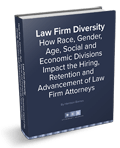
|
| Harrison Barnes |
Yet even the most progressive firms exhibit trends in hiring related to diversity. Law firms’ hiring of diverse attorneys follows patterns according to whether the new hire is an entry-level attorney, a lateral associate, or a lateral partner. On the whole, as mentioned above, firms do better in meeting diversity objectives with entry-level hires, who are lower on the social hierarchy in firms, than with any type of lateral hire.
Entry-Level Hiring
Comparatively, it is easier for diverse attorneys to get hired at the entry level than at the lateral level.[1] In my experience, law firms hiring at the lateral level, and especially at the partner level, are little concerned about diversity. There are various reasons why firms are more likely to hire diverse candidates at the entry level.
There are more people involved in entry-level hiring. Entry-level attorneys typically are hired to work in the firm generally, not to work for one specific partner or attorney. Later, when attorneys become established in a firm, then they are tracked toward specific senior attorneys.
Entry-level attorneys are interviewed by a mix of associates, partners, and others—all of whom weigh in on whether to hire the person, so homophily comes into play to a much lower degree in the interviewing process. It is less about one person liking the attorney and more about the firm deciding whether the attorney is qualified. Also, the law firm’s hiring and management committees can consider the importance of diversity and other factors that affect the firm’s reputation in the legal community when making hiring decisions.
| Partners | Associates | Total Lawyers | Summer Associates | |||||||||
| % Women |
% Minority |
% Minority Women |
% Women |
% Minority |
% Minority Women |
% Women |
% Minority |
% Minority Women |
% Women |
% Minority |
% Minority Women |
|
| 2009 | 19.21% | 6.05% | 1.88% | 45.66% | 19.67% | 11.02% | 32.97% | 12.59% | 6.33% | 46.62% | 24.04% | 12.90% |
| 2010 | 19.43 | 6.16 | 1.95 | 45.41 | 19.53 | 10.90 | 32.69 | 12.40 | 6.20 | 47.35 | 26.99 | 14.92 |
| 2011 | 19.54 | 6.56 | 2.04 | 45.35 | 19.90 | 10.96 | 32.61 | 12.70 | 6.23 | 47.71 | 27.11 | 15.19 |
| 2012 | 19.91 | 6.71 | 2.16 | 45.05 | 20.32 | 11.08 | 32.67 | 12.91 | 6.32 | 46.26 | 29.55 | 16.26 |
| 2013 | 20.22 | 7.10 | 2.26 | 44.79 | 20.93 | 11.29 | 32.78 | 13.36 | 6.49 | 45.32 | 29.51 | 15.78 |
| 2014 | 21.05 | 7.33 | 2.45 | 44.94 | 21.63 | 11.51 | 33.48 | 13.83 | 6.74 | 46.33 | 30.27 | 16.63 |
| 2015 | 21.46 | 7.52 | 2.55 | 44.68 | 22.00 | 11.78 | 33.38 | 13.97 | 6.81 | 47.78 | 31.16 | 16.99 |
| 2016 | 22.13 | 8.05 | 2.76 | 45.00 | 22.72 | 12.42 | 33.89 | 14.62 | 7.23 | 48.71 | 32.33 | 18.05 |
Table 6.1 Women and Minorities at Law Firms, 2009–2016. Source: The NALP Directory of Legal Employers
A close watch is kept on law firm hiring. The National Association for Law Placement (NALP), law schools, attorneys, and potential summer associates, among others, closely watch law firm hiring practices at the entry level. NALP, an influential professional association that advises legal professionals, from law students and attorneys to law firms and law schools, champions diversity and inclusion. It operates under the beliefs that “all law students and lawyers should benefit from a fair and ethical hiring process . . . [and] a diverse and inclusive legal profession best serves clients and our communities.” It serves its members by collecting and publishing legal employment data.[2] (See Table 6.1.)
Firms are under pressure to appear diverse by hiring a diverse class of summer associates. Law firms that do not put together a diverse class of summer associates can come off as being discriminatory in their hiring practices, whether that is true or not. Law firms seek to hire diverse attorneys at the entry level because they know NALP is tracking these hires and they want to present the best possible face to the public. To complement this discussion, our article The Most and Least Diverse Law Firms in the United States highlights which firms are most affected by these hiring trends.
Even though entry-level hires are unproven commodities, a firm’s investment in them is comparatively minimal. If the attorney does not do good work, the law firm can write off many of his or her hours. The firm can also give the attorney busywork to do until the attorney leaves. Major national law firms often have large institutional clients with ongoing unsophisticated work (document reviews, due diligence, discovery) that low-skilled entry-level attorneys can do without too much risk to the law firm.
The law firm can send a message—directly or indirectly—to an entry-level attorney who is not a good fit that it makes sense for the attorney to move on, and the attorney often is able to find a new job quickly.
Clients may give law firms marching orders to assemble diverse teams to work on their matters. Partners consider hiring diverse teams when they have a large case or matter to be staffed, and diversity requirements can be met with diverse entry-level attorneys, who are relatively low-risk hires. Placing entry-level attorneys on low-risk matters is not likely to hurt a firm’s business substantially.[3] However, the most powerful partners representing the largest companies may not be willing to change their hiring criteria to be more inclusive of diverse employees despite their marching orders for diversity.
Lateral Hiring
At the lateral level, more than at the entry level, law firms operate like meritocracies, where talented people are chosen to move ahead based on their ability. Law firms are open to including diverse attorneys at the lateral level, but they do not change their hiring qualifications out of diversity concerns:
- At the lateral associate level, almost all law firms hire based on the attorney’s qualifications: education (the quality of the attorney’s academics and law school); strength of current employer (the quality of the law firm the attorney is coming from); practice area (the type of work the attorney is doing and the law firm’s need for that specialization); presumed commitment to the type of work the attorney is interviewing for (whether the law firm believes the attorney will stick around); presumed fit with the culture of the firm; and diversity of the attorney.
- At the lateral partner level, most law firms hire based on the amount of business an attorney brings. I have seen only a few rare instances when law firms have hired a partner for diversity reasons—law firms simply do not hire partners who do not have substantial business (unless the partner’s business is in a very niche practice area that the firm cannot service on its own).[4]
As in society, the further up the social hierarchy you go, the less diversity you find, partly as a result of higher-status partners perpetuating a system of hiring that started out not including diverse attorneys.
Most large law firms know that their hires are likely to stay only for the short term. Associates are short-term “investments” because they are likely to leave (or be asked to leave); very few stick around to become partners. Partners are guilty of “short termism,” too, because they stay with a law firm only as long as they are paid what they want, are happy, and the firm recruits the best talent for them to work on their matters.
Usually, law firms hire lateral associates to work with a specific attorney in the law firm. This attorney (generally, a partner) simply hires the person with the best qualifications and with whom the partner is most comfortable. The law firm cannot influence the hiring attorney to hire one candidate over another on the basis of diversity because the law firm’s role is to provide a service to the hiring attorney, who needs work done. Unless the hiring attorney is being pressured by clients to hire for diversity, it is unlikely diversity will factor much into the hiring decision—other than where diversity intersects with homophily and hierarchy, which usually results in a hiring process that overlooks or dismisses diverse candidates on the basis of various misperceptions. (See “Preconceptions about Diverse Attorneys” later in this book.)
Large law firms are often made up of hundreds of small businesses, with each partner’s business contributing to the whole. Partners can get up and go anywhere at any time. A fluid lateral market means that law firms must hold on to their business generators and the attorneys who bring in business.[5] Firms are not interested in undertaking initiatives that can potentially dilute profits or displease partners and make them go away. Likewise, business generators have no incentive to build for the future of the firm because they are motivated by their individual needs rather than by societal concerns about increasing diversity.[6] This is not to say that law firms and partners do not share the interest in diversity of their clients and society but that they are more motivated by their business interests (money) than by the common good.[7]
Because of the short-term-thinking, dog-eat-dog world of the law firm, calculations about diversity often do not factor into lateral hiring decisions. Whereas Human Resources can ensure a steady inflow of diverse attorneys at the entry level, it is much more difficult at the lateral level, where individual partners do so much hiring and have so many preconceptions about what they want and do not want.[8]
The following subsections discuss why law firms are less likely to hire diverse candidates as the lateral level.
Attrition
A substantial portion of attorneys enter law firms and find that law firm life is not for them.[9] Attrition is a major issue with all attorneys—regardless of diversity—but retention issues are exacerbated for diverse attorneys, and thus law firms assume a greater risk hiring them at the lateral level.
Work in a law firm can be extremely difficult. According to one attorney:
I lasted five years, and once my student loans were paid off, I got the hell out. It was demoralizing, working like a dog doing mundane work and my vitality was slipping day by day. The hours and stress were killing me.
I got into the office at 8:00 am and left at 10:00 pm every day, plus I would also work one day on the weekends. I would work about 70–80 hours a week. The stress was unbelievable, especially coming from senior associates and partners in the firm. Everyone was biting each other heads off to get ahead. The senior associates viewed you as competition to become a partner and they would treat new associates like slave labor.
[Before I joined] my law firm showed us brochures with smiling associates, promised us interesting work, and the infamous “work life balance” bullshit. It was shocking because you are their slave and then they send you back to your old law school to recruit new people.[10]
See Effective Strategies for Recruiting and Retaining Minority Attorneys for proven ways to harmonize recruitment and inclusion.
Potential for Dead Weight
Law firms are afraid of hiring unproductive or untalented associates who may not work out. At the entry level, associates are put on assignments that are less consequential, and the law firm can write off the hours of entry-level associates who do not do good work. If they are asked to leave a firm, entry-level associates typically have other job options.
After a year or two, attorneys are expected to be more efficient. At this point, law firms are exposed to serious risks if the attorney does not do good work. The firm can lose the money, time, and resources it expended to train the new hire, can face a lawsuit, or can expend further resources if the attorney stays longer than the firm wants.
La
About Harrison Barnes
No legal recruiter in the United States has placed more attorneys at top law firms across every practice area than Harrison Barnes. His unmatched expertise, industry connections, and proven placement strategies have made him the most influential legal career advisor for attorneys seeking success in Big Law, elite boutiques, mid-sized firms, small firms, firms in the largest and smallest markets, and in over 350 separate practice areas.
A Reach Unlike Any Other Legal Recruiter
Most legal recruiters focus only on placing attorneys in large markets or specific practice areas, but Harrison places attorneys at all levels, in all practice areas, and in all locations-from the most prestigious firms in New York, Los Angeles, and Washington, D.C., to small and mid-sized firms in rural markets. Every week, he successfully places attorneys not only in high-demand practice areas like corporate and litigation but also in niche and less commonly recruited areas such as:
- Immigration Law
- Workers Compensation
- Insurance
- Family Law
- Trust and Estate
- Municipal law
- And many more...
This breadth of placements is unheard of in the legal recruiting industry and is a testament to his extraordinary ability to connect attorneys with the right firms, regardless of market size or practice area.
Proven Success at All Levels
With over 25 years of experience, Harrison has successfully placed attorneys at over 1,000 law firms, including:
- Top Am Law 100 firms such including Sullivan and Cromwell, and almost every AmLaw 100 and AmLaw 200 law firm.
- Elite boutique firms with specialized practices
- Mid-sized firms looking to expand their practice areas
- Growing firms in small and rural markets
He has also placed hundreds of law firm partners and has worked on firm and practice area mergers, helping law firms strategically grow their teams.
Unmatched Commitment to Attorney Success - The Story of BCG Attorney Search
Harrison Barnes is not just the most effective legal recruiter in the country, he is also the founder of BCG Attorney Search, a recruiting powerhouse that has helped thousands of attorneys transform their careers. His vision for BCG goes beyond just job placement; it is built on a mission to provide attorneys with opportunities they would never have access to otherwise. Unlike traditional recruiting firms, BCG Attorney Search operates as a career partner, not just a placement service. The firm's unparalleled resources, including a team of over 150 employees, enable it to offer customized job searches, direct outreach to firms, and market intelligence that no other legal recruiting service provides. Attorneys working with Harrison and BCG gain access to hidden opportunities, real-time insights on firm hiring trends, and guidance from a team that truly understands the legal market. You can read more about how BCG Attorney Search revolutionizes legal recruiting here: The Story of BCG Attorney Search and What We Do for You.
The Most Trusted Career Advisor for Attorneys
Harrison's legal career insights are the most widely followed in the profession.
- His articles on BCG Search alone are read by over 150,000 attorneys per month, making his guidance the most sought-after in the legal field. Read his latest insights here.
- He has conducted hundreds of hours of career development webinars, available here: Harrison Barnes Webinar Replays.
- His placement success is unmatched-see examples here: Harrison Barnes' Attorney Placements.
- He has created numerous comprehensive career development courses, including BigLaw Breakthrough, designed to help attorneys land positions at elite law firms.
Submit Your Resume to Work with Harrison Barnes
If you are serious about advancing your legal career and want access to the most sought-after law firm opportunities, Harrison Barnes is the most powerful recruiter to have on your side.
Submit your resume today to start working with him: Submit Resume Here
With an unmatched track record of success, a vast team of over 150 dedicated employees, and a reach into every market and practice area, Harrison Barnes is the recruiter who makes career transformations happen and has the talent and resources behind him to make this happen.
A Relentless Commitment to Attorney Success
Unlike most recruiters who work with only a narrow subset of attorneys, Harrison Barnes works with lawyers at all stages of their careers, from junior associates to senior partners, in every practice area imaginable. His placements are not limited to only those with "elite" credentials-he has helped thousands of attorneys, including those who thought it was impossible to move firms, find their next great opportunity.
Harrison's work is backed by a team of over 150 professionals who work around the clock to uncover hidden job opportunities at law firms across the country. His team:
- Finds and creates job openings that aren't publicly listed, giving attorneys access to exclusive opportunities.
- Works closely with candidates to ensure their resumes and applications stand out.
- Provides ongoing guidance and career coaching to help attorneys navigate interviews, negotiations, and transitions successfully.
This level of dedicated support is unmatched in the legal recruiting industry.
A Legal Recruiter Who Changes Lives
Harrison believes that every attorney-no matter their background, law school, or previous experience-has the potential to find success in the right law firm environment. Many attorneys come to him feeling stuck in their careers, underpaid, or unsure of their next steps. Through his unique ability to identify the right opportunities, he helps attorneys transform their careers in ways they never thought possible.
He has worked with:
- Attorneys making below-market salaries who went on to double or triple their earnings at new firms.
- Senior attorneys who believed they were "too experienced" to make a move and found better roles with firms eager for their expertise.
- Attorneys in small or remote markets who assumed they had no options-only to be placed at strong firms they never knew existed.
- Partners looking for a better platform or more autonomy who successfully transitioned to firms where they could grow their practice.
For attorneys who think their options are limited, Harrison Barnes has proven time and time again that opportunities exist-often in places they never expected.
Submit Your Resume Today - Start Your Career Transformation
If you want to explore new career opportunities, Harrison Barnes and BCG Attorney Search are your best resources. Whether you are looking for a BigLaw position, a boutique firm, or a move to a better work environment, Harrison's expertise will help you take control of your future.
Submit Your Resume Here to get started with Harrison Barnes today.
Harrison's reach, experience, and proven results make him the best legal recruiter in the industry. Don't settle for an average recruiter-work with the one who has changed the careers of thousands of attorneys and can do the same for you.
About BCG Attorney Search
BCG Attorney Search matches attorneys and law firms with unparalleled expertise and drive, while achieving results. Known globally for its success in locating and placing attorneys in law firms of all sizes, BCG Attorney Search has placed thousands of attorneys in law firms in thousands of different law firms around the country. Unlike other legal placement firms, BCG Attorney Search brings massive resources of over 150 employees to its placement efforts locating positions and opportunities its competitors simply cannot. Every legal recruiter at BCG Attorney Search is a former successful attorney who attended a top law school, worked in top law firms and brought massive drive and commitment to their work. BCG Attorney Search legal recruiters take your legal career seriously and understand attorneys. For more information, please visit www.BCGSearch.com.
Harrison Barnes does a weekly free webinar with live Q&A for attorneys and law students each Wednesday at 10:00 am PST. You can attend anonymously and ask questions about your career, this article, or any other legal career-related topics. You can sign up for the weekly webinar here: Register on Zoom
Harrison also does a weekly free webinar with live Q&A for law firms, companies, and others who hire attorneys each Wednesday at 10:00 am PST. You can sign up for the weekly webinar here: Register on Zoom
You can browse a list of past webinars here: Webinar Replays
You can also listen to Harrison Barnes Podcasts here: Attorney Career Advice Podcasts
You can also read Harrison Barnes' articles and books here: Harrison's Perspectives
Harrison Barnes is the legal profession's mentor and may be the only person in your legal career who will tell you why you are not reaching your full potential and what you really need to do to grow as an attorney--regardless of how much it hurts. If you prefer truth to stagnation, growth to comfort, and actionable ideas instead of fluffy concepts, you and Harrison will get along just fine. If, however, you want to stay where you are, talk about your past successes, and feel comfortable, Harrison is not for you.
Truly great mentors are like parents, doctors, therapists, spiritual figures, and others because in order to help you they need to expose you to pain and expose your weaknesses. But suppose you act on the advice and pain created by a mentor. In that case, you will become better: a better attorney, better employees, a better boss, know where you are going, and appreciate where you have been--you will hopefully also become a happier and better person. As you learn from Harrison, he hopes he will become your mentor.
To read more career and life advice articles visit Harrison's personal blog.







